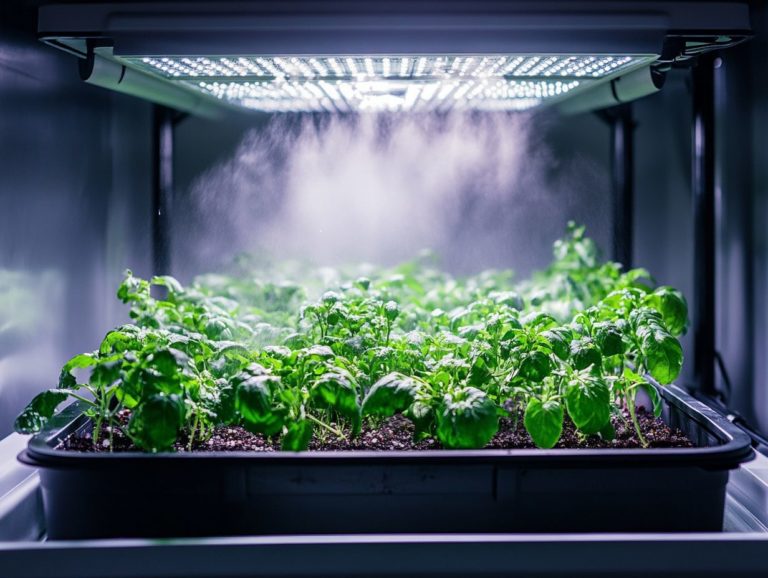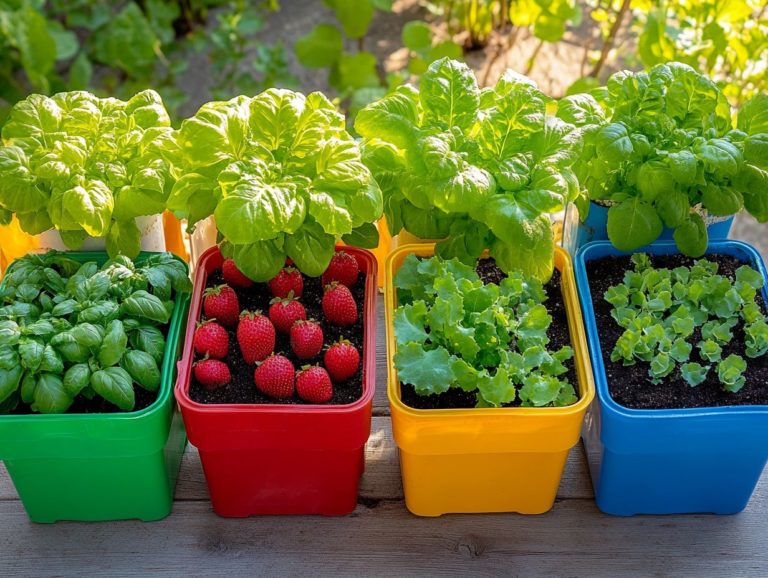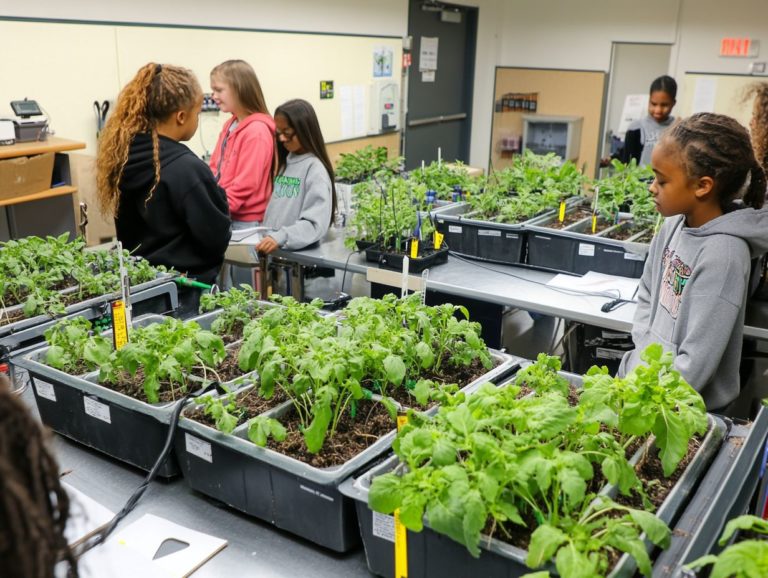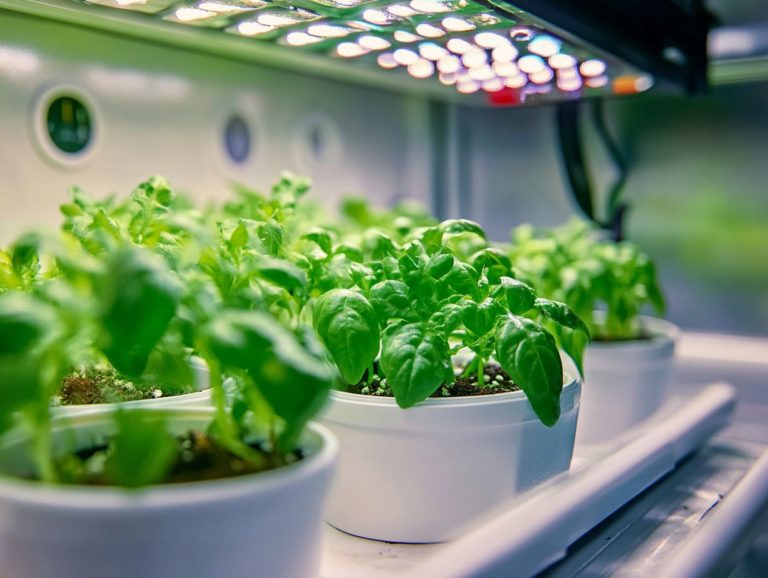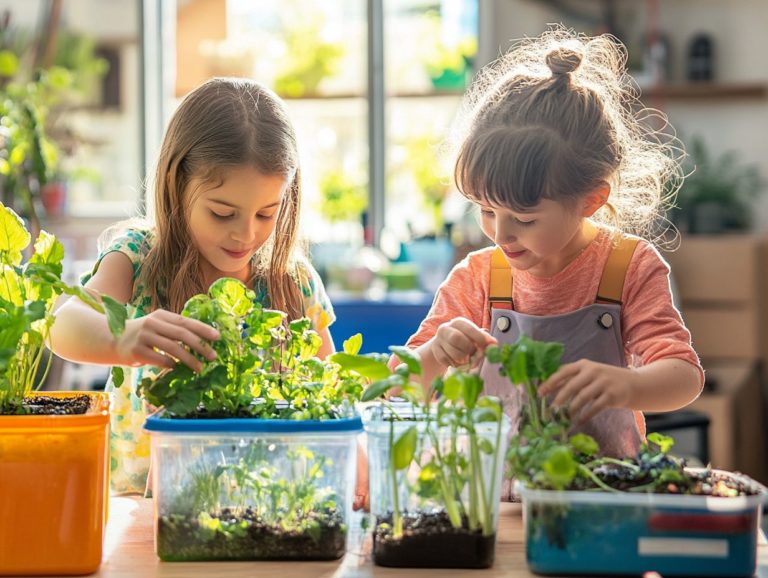How to Find Hydroponic Gardening Workshops?
Curious about hydroponic gardening and ready to elevate your green thumb? Dive into this essential guide to exploring hydroponic gardening workshops and training programs!
From engaging hands-on learning experiences to forging valuable community connections, you ll gain insights on what to expect and how to prepare. Everything you need to maximize these educational opportunities is right here at your fingertips.
Uncover where to locate local workshops and enhance your learning journey through comprehensive information and online resources. Immerse yourself and cultivate your knowledge!
Contents
- Key Takeaways:
- Benefits of Attending Workshops
- Finding Local Workshops
- What to Expect at a Hydroponic Gardening Workshop
- Preparing for a Workshop
- Maximizing Your Learning Experience
- Frequently Asked Questions
- 1. How can I find hydroponic gardening workshops in my area?
- 2. Are there any national organizations that offer hydroponic gardening workshops?
- 3. Can I attend a hydroponic gardening workshop online?
- 4. Are there any fees for attending these workshops?
- 5. How can I help organize a hydroponic gardening workshop?
- 6. Are hydroponic gardening workshops suitable for beginners?
Key Takeaways:
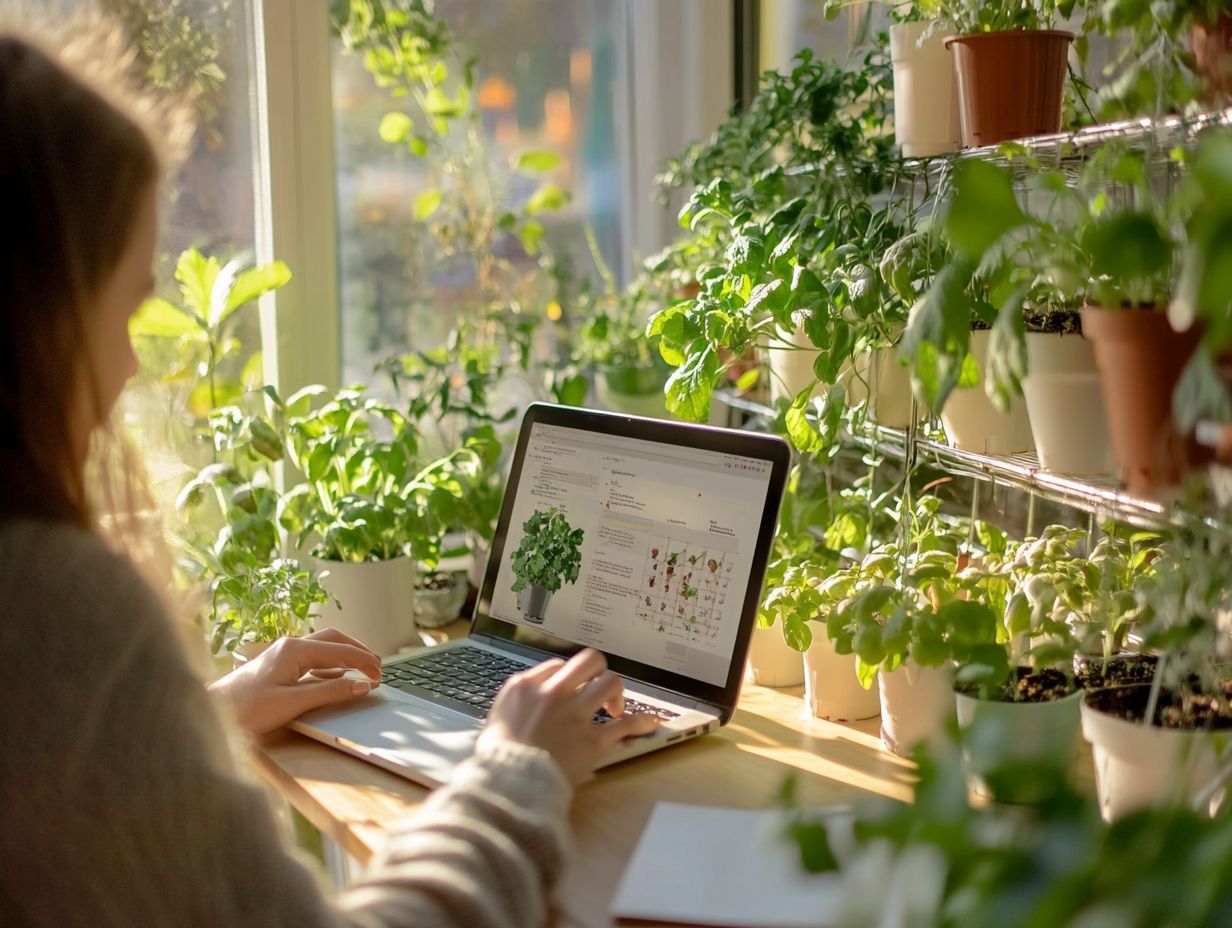
- Learn more about hydroponic farming through hands-on workshops and community building.
- Find local workshops through online resources and local organizations.
- Prepare for a workshop by bringing necessary supplies and materials to maximize your learning experience.
Understanding Hydroponic Gardening
Hydroponic gardening is a new way of food production that allows you to cultivate plants without soil, using nutrient-rich water to deliver essential minerals directly to the roots. This innovative approach conserves water and maximizes space efficiency, enabling vertical farming and greenhouse gardening in urban environments.
By optimizing plant health in controlled settings, hydroponic systems offer sustainable solutions for food security while significantly reducing food miles and enhancing food safety. As urban agriculture becomes increasingly popular, understanding the fundamentals of hydroponic gardening is essential for anyone looking to grow their own food or support sustainable practices.
With the capability to produce fresh vegetables and herbs year-round, hydroponic gardening presents numerous advantages over traditional farming methods, including lower pesticide usage, efficient resource management, and enhanced crop yields. There are various hydroponic systems available, such as nutrient film technique (NFT), deep water culture (DWC), and aeroponics, each tailored to different gardening needs, making this method accessible to both novices and seasoned gardeners.
This approach promotes not only individual gardening but also fosters community support through local initiatives that educate people about sustainable practices, instilling a sense of responsibility towards food production. As more individuals embrace hydroponics, it becomes an integral component of a broader sustainable food network.
Benefits of Attending Workshops
Attending workshops focused on hydroponic gardening presents a wealth of advantages, from immersive learning experiences to valuable networking opportunities within the hydroponics community. You can connect with agriculture experts, acquire in-depth knowledge of cutting-edge growing techniques, and practice hydroponic methods in a collaborative setting.
These workshops cultivate community support while promoting sustainable practices and offering educational materials. By participating, you sharpen your skills and play a vital role in a movement dedicated to enhancing food security and environmental health in your local area.
Hands-on Learning and Community Building
Hands-on learning is a vital element in hydroponic gardening workshops, empowering you to translate theoretical knowledge into practical application. This immersive experience heightens your engagement and nurtures a sense of community among fellow participants.
As you dive into the gardening process, you acquire essential skills that extend beyond urban agriculture; these abilities are transferable to various facets of your life, including valuable lessons in financial literacy related to budgeting for gardening supplies and resources.
This collaborative atmosphere paves the way for networking and mentorship opportunities, allowing you to learn from seasoned gardeners who share their expertise. As you cultivate crops side by side, you ll gain insights into the environmental advantages of sustainable practices and the significance of local food systems, further inspiring your commitment to transforming your neighborhood into a vibrant, green space.
Finding Local Workshops

Discover local hydroponic gardening workshops to elevate your skills and knowledge while fostering a sense of community through shared learning experiences.
A variety of resources awaits you, including community gardens, local agricultural extensions, and online platforms that provide detailed information on hydroponic technology and sustainable practices.
Government publications and organizations like Green Our Planet and the USDA compile educational materials and events for those eager to explore hydroponic technology and food justice.
By utilizing these resources, you can easily connect with local workshops that match your interests in food production and sustainable solutions.
Online Resources and Local Organizations
Online resources are vital for connecting you with organizations offering hydroponic gardening workshops, community workshops, and training programs. Platforms like Flex Farm and CropKing provide valuable insights into hydroponic systems and technology.
Organizations such as STEMworks promote hands-on learning opportunities for students and adults, enhancing engagement in hydroponic systems.
These notable platforms also host a range of training events and workshops focusing on the latest advancements in hydroponic techniques. Community-supported agriculture organizations often organize workshops highlighting local food systems and eco-friendly practices.
Websites like the Hydroponics and Indoor Gardening subreddit serve as fantastic forums for enthusiasts to exchange experiences and advice.
These diverse resources create a supportive environment, empowering you to embrace hydroponic gardening and contribute to sustainability efforts in your community, including support for local food systems.
What to Expect at a Hydroponic Gardening Workshop
At a hydroponic gardening workshop, anticipate a variety of topics, from foundational principles to advanced techniques aimed at optimizing plant health.
Prepare for hands-on learning experiences where you can practice hydroponic methods, interact with nutrient-rich water, and explore innovative plant propagation techniques.
These workshops equip you with knowledge on soil-less cultivation growing plants without soil and ignite a passion for sustainable practices in your garden and community.
Topics Covered and Activities
The topics covered can range from nutrient management to innovative growing methods. Expect lively discussions, practical demonstrations of hydroponic techniques, and collaborative projects that foster community involvement.
As you delve deeper, you might explore sustainable practices, food justice, and the impact of urban agriculture on food security, enriching your gardening education while connecting with like-minded individuals.
In addition to these core areas, workshops often cover specific sustainable solutions you can implement personally and in your community.
Participate in hands-on activities, like building your own hydroponic system, to gain practical skills for home or local urban food hubs.
Discussions may highlight the role of community gardens in promoting food sovereignty and resilience against food deserts.
These workshops aim not only to provide knowledge but also to strengthen community ties, empowering you to advocate for sustainable urban agriculture initiatives.
Don t miss your chance to learn! Start your hydroponic journey now!
Preparing for a Workshop

Get ready for your hydroponic gardening workshop! Gather essential supplies to make the most of your learning experience. Don’t forget to pack your notebooks and pens!
Hands-on activities boost engagement and create a supportive community among participants. Sharing your experiences with others enriches the collaborative atmosphere and makes the gardening education experience all the more rewarding.
Supplies and Materials to Bring
Bringing the right supplies is crucial for a successful workshop. Items like gardening gloves, small containers for plant propagation, and notebooks for capturing valuable insights are essential.
You should also consider bringing a variety of organic seeds. Exploring different plant varieties can spark creativity in your hydroponic designs. A reusable water bottle is a smart addition, promoting sustainability while keeping you hydrated during these immersive sessions.
Incorporate essential tools, such as pH meters (to measure acidity) and nutrient solutions (that provide plants with essential minerals). These tools help sharpen your practical skills and support ongoing community initiatives and sustainability efforts.
Maximizing Your Learning Experience
Maximize your workshop experience by preparing and engaging actively. Come with questions and be ready to dive into hands-on activities. Embrace active participation, nurture your curiosity, and engage with both instructors and fellow attendees.
You’re encouraged to ask questions, share your own experiences, and seek community support to deepen your understanding of hydroponic techniques and sustainable practices.
Taking notes and engaging in collaborative discussions can significantly enhance your overall gardening education, ensuring that the knowledge you gain is effectively applied in your personal gardening projects.
Tips for Getting the Most Out of a Workshop
To truly maximize your experience, adopt a proactive approach that emphasizes preparation, engagement, and collaboration. Networking with fellow attendees and sharing insights creates lasting relationships that extend beyond the workshop.
Before the workshop kicks off, familiarize yourself with basic hydroponic techniques and terminology. This foundation will empower you to delve deeper into discussions.
Keep communication open with both instructors and peers; this can lead to invaluable exchanges of knowledge. Consider forming small groups to tackle specific gardening challenges together. This fosters camaraderie and encourages collective problem-solving.
After the session wraps up, connect with fellow gardeners on social media to keep the conversation going! This strengthens your sense of community and enriches your journey in gardening education and urban agriculture.
Frequently Asked Questions
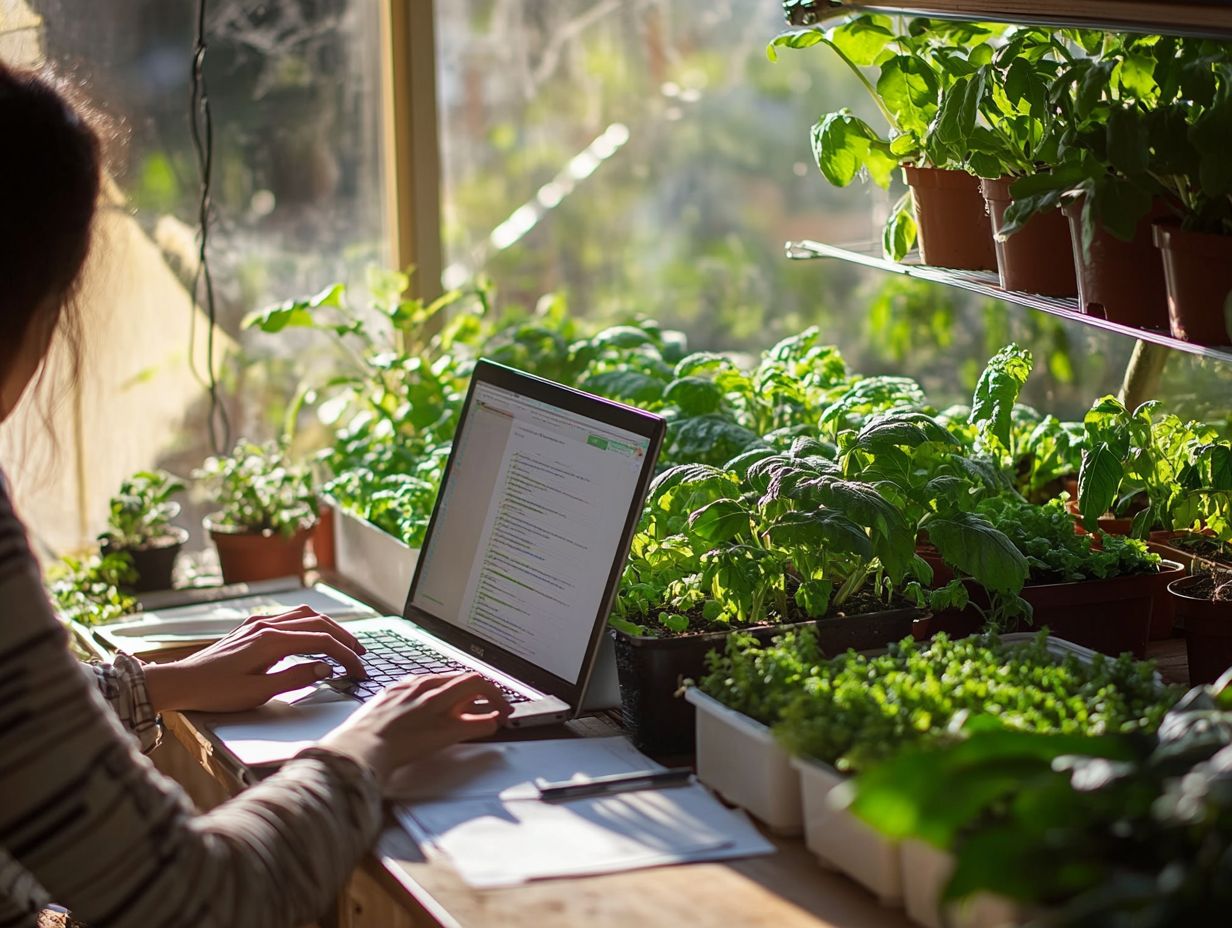
1. How can I find hydroponic gardening workshops in my area?
One way to find hydroponic gardening workshops is to search online using keywords such as “hydroponic gardening workshops near me” or “hydroponic gardening classes [your city/town].” You can also check with local community centers, garden supply stores, or horticulture clubs for any upcoming workshops.
2. Are there any national organizations that offer hydroponic gardening workshops?
Yes, several national organizations offer hydroponic gardening workshops, such as the Hydroponic Society of America and the Hydroponic Gardening Association. These organizations often have a list of upcoming workshops on their websites.
Ready to start your hydroponic journey? Find a workshop near you today!
3. Can I attend a hydroponic gardening workshop online?
Yes! Many online hydroponic gardening workshops are available. You can find them with a quick internet search or by visiting gardening communities and forums.
4. Are there any fees for attending these workshops?
Fees vary by workshop and organizer. Some are free, while others may charge a registration or materials fee. Always check with the organizer for details!
5. How can I help organize a hydroponic gardening workshop?
If you’re passionate about hydroponic gardening, reach out to local community centers, schools, or gardening clubs. Collaborating with experienced gardeners is another excellent way to create a workshop.
6. Are hydroponic gardening workshops suitable for beginners?
Absolutely! There are workshops specifically for beginners. They cover the basics like setting up your system, selecting plants, and maintaining everything. It’s a fantastic opportunity to learn the essentials!

